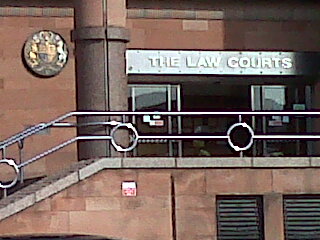Sometimes, my writer’s imagination colours what I expect from an experience. When I went camping I hoped I’d have a famous five adventure (I didn’t). And this past fortnight, when I was called for jury service, although I hoped for something akin to Twelve Angry Men, I had a suspicion it wouldn’t be quite like that. You’re chosen for jury service at random, receiving a summons with dire warnings about what will happen to you if you don’t attend. The first day is like the first day at school as we report in and wait in a nervous huddle to see what happens next.
We’re led to the jury assembly area. From now on, we’re divided from anyone else who enters the court building. We have our own entrance to the building and to the court rooms. We’ll become well-acquainted with the assembly room over the next fortnight. They do try to cater for us, with a couple of TVs, a small cafeteria, a pool table and warnings to bring something to amuse ourselves with. But this doesn’t quite make up for the fact that we are confined to this room, unable to leave except at lunch time or if called into court. The room is institutional: sickly yellow walls, green vinyl chairs and a green and purple patterned carpet (I study the carpet a lot). There’s a little excitement on the first morning as we’re led into a court room to watch a DVD about being a juror. There aren’t many of us, so we think we stand a good chance of being chosen, until we return to the assembly area to find that 50 or so other potential jurors have appeared.
And so the waiting begins. The whiteboard tells us how many trials are due to start that day, but this doesn’t account for those that will not go ahead for one reason or another. The day is marked by two flutters of excitement, at 10.30 and 2pm, when ushers sweep into the room to claim the juries for various courts. Every time the jury officer gets a phone call, or leaves her desk, the anticipation builds, as she may be about to announce that a new jury panel has been called. Names are chosen at random – some of us will spend a fortnight in the room never being called. And it’s a strange kind of waiting. Not the kind where you can really settle into a book or some writing, because a part of you is always on the alert. You can be called at a moment’s notice, including just before lunch or at the end of the day. They say the wheels of justice turn slowly and they aren’t kidding.
I’m called to my first panel half an hour before lunch on the second day. Fifteen people are called to the panel. We all enter the court room and wait anxiously as twelve names are called. Fortunately I don’t have to suffer the misery of being rejected and I’m sworn in to my first jury. When you’re not on a jury, you watch those who are jurors come and go as though they’re a breed apart – you really want to be one of them instead of one of the rejects sat in the holding pen. And then, the magic moment arrives, and you are a juror – and you feel different. There’s a little strut in your step as you’re called to your court by your usher, feeling sorry for those left behind. When you return to the assembly area, it’s with a small sense of freedom as your timetable is now dictated by the judge. That afternoon, we listen to some evidence, but there are delays and ‘matters of law’ to be discussed behind the scenes. Eventually, we’re informed that the trial won’t go ahead due to lack of evidence. I’ve spent an hour and a half in total as a juror in my first week.
In the second week, I’m called again. This trial lasts, so I’m able to see the process through. The court room is very modern and much more attractive than our holding area. The judge is sharp, smart and relatively young, sitting at his bench in the most comfortable chair in the room, beneath the royal coat of arms (because judges are official representatives of the crown). The barristers, on the other hand, are like every stereotype of a barrister I’d imagined: be-wigged older men with very posh accents, their smart suits only just visible beneath robes that look as though they need an iron. We’re reminded that it’s us, the jury, who are the judges here. Although the judge is responsible for matters of law, it’s we who decide the outcome. We’re also reminded that it isn’t up to the defence to prove the innocence of the defendant, it’s up to the prosecution to prove the defendant’s guilt, beyond reasonable doubt. We’ve all heard this before in fiction, but being part of it makes the principle sink in. And there is an added complication in modern times – we’re warned very clearly not to discuss the case using social media, or to try to research it using the Internet. In the end, our deliberations don’t take long. There’s no need to be Henry Fonda. We all know that the case hasn’t been proven beyond a reasonable doubt. We give someone good news that day, bringing to an end a two year period of waiting for the defendant.
When my jury service is over, part of me is sad that it’s ending. The courts are in a spectacular location on the quayside (of which more in another post) so for half an hour each morning I spend some time enjoying the view. And once I settle into the waiting, I manage to read a novel and draft three short stories. Ultimately though, I’ve loved being part of this experience. At the end of our trial, the judge thanks us and reminds us that as jurors, it’s us, by our decisions, who are upholding the standard of justice in the land. It has been proposed a number of times in the UK that the right to trial by jury for less serious cases should be abolished. Under those proposals, the trial I was involved in would most likely never have gone beyond a magistrates’ court. While I can appreciate the costs involved in a trial at the crown courts, I think something valuable would begin to be eroded by limiting the crimes that can be tried by a jury. For all its eccentricities and inconvenience, I felt as though by serving as a juror, I’d done something important.






What an incredible experience Andrea! I know I would love being given the opportunity to sit as a juror. I’m sure this experience has inspired some stories 🙂
LikeLike
I always wanted to do it Yolanda, but never thought I’d get chosen, so I’m really pleased I got to do it. My story radar was on full alert while I was there 🙂
LikeLike
Interesting to read how things are done in the UK which isn’t too different from the US. We only get called for one week rather than two, though. But if we get selected, then of course we’d serve as long as the trial lasts. I’ve had two jury duty weeks, but neither time did I have to go in (we phone a number the night before and see if our group number will be needed the next day). Still, it made for a pins-and-needles week at my job, wondering if I’d have to suddenly leave for the day.
LikeLike
I think it’d be worse having to go to work and then potentially getting called – despite the waiting, at least we were in that mindset, rather than trying to focus on work while being on the alert!
LikeLike
It was especially tricky having a day full of scheduled patients! But they were told in advance that I might not be able to make it. Luckily it all worked out.
LikeLike
Although we all want to do our civic duty, I think the normal reaction when we first receive a summons for jury duty is “Oh great.” But then we realize how important it is.
I lived in Virginia all my life and received a summons the week before I was scheduled to move. After living in NC for 1 year, I received a summons. My fear is being picked for a murder trial and being sequestered for months. 😦
I enjoyed reading about your experience, Andrea.
LikeLike
Thanks Jill, you’re right, most people seem to not be too happy when they get summoned – although I was the opposite 🙂 Yes, you hope when you’re there you’ll get something interesting, but actually sitting on something like a murder trial must be quite difficult emotionally, as well as the time commitment.
LikeLike
We have a similar system in the US and I have received a jury duty notification several times since I became an American citizen. In all cases I and the other people were sent back because there was no trial. Perhaps because I chose to be naturalized, I take jury duty seriously. If I had had to stay for weeks it would have been hard on my family life but I would have done it. So I share your point of view about being useful when on jury.
LikeLike
It is amazing how many trials never get to be heard. Of all the trials due to start when I was there, only a handful actually made it.
LikeLike
I always wondered what jury service was like and now I know!
LikeLike
Yes, it’s not quite how you imagine it. I was prepared as all the people I’d spoken to talked about the waiting around without actually being involved much in trials – but you still hope you’ll get something interesting 🙂
LikeLike
And there I was thinking you were having a Perry Mason experience! I know from my brother in law who has also done a stint of jury service, that there can be a lot of hanging about, although he was lucky to have a case that lasted a week.
Interesting post, Andrea, and it hasn’t put me off wanting to be picked – I’ll just remember to take a good book and be prepared for patience 🙂
LikeLike
Well, the judge on my trial did say to us at the beginning, this isn’t a television show, don’t go off and try to investigate in your own time 🙂 Patience and being prepared for the wait is the key.
LikeLike
Andrea that was interesting, I have never been called up for jury duty, it sounds like lots of time waiting around.
LikeLike
It is that, unless you’re lucky to be picked for a longer trial at the beginning of your service.
LikeLike
Fascinating account of your jury service Andrea and I agree wholeheartedly with all you say about the importance of taking our civic duties seriously. Ironically, I have never been called to Jury service here but when I lived in California I was summoned three separate times! Yet, because I wasn’t an American citizen, I was ineligible. I was so disappointed, although in reality it would have been very difficult as at the time I had three young children and couldn’t leave them. As an avid reader of true crime, I had visions of sitting on the trial of the century (although thank goodness not the O J Simpson case, LOL!!). Very proud of you fellow citizen, very well done 🙂
LikeLike
Thank you! My partner is a true crime fan, so she was quite envious 🙂 Nothing at all as high profile as that for me, but it was still interesting being part of the whole process.
LikeLiked by 1 person
They say write what you know, and that must have been one great experience to draw from for writing! 🙂
LikeLike
It was Mishka – something out of the norm to draw from 🙂
LikeLike
I love how you detailed your experience waiting to be chosen and then being on a jury. Very cool!
LikeLike
Thanks Kourtney, the waiting was all part of the experience 🙂
LikeLike
I’m so glad you finished the experience feeling good about it.
Hugs!
LikeLike
It may have been another story if I’d been one of those who waited for a fortnight and never got chosen 🙂
LikeLike
I’m jealous 😦 I’ve waited 37 years to be a juror, yet I know people that have been called several times. Not sure my employer would like it much but tough. Here in Jersey juries only get used in the most serious cases.
LikeLike
I did think I’d probably never get chosen, so it was a pleasant surprise 🙂 Sounds as though we may go the same way in the rest of the UK at some point.
LikeLike
Great experience and thank you for the story!!!
LikeLike
Thanks Cybele 🙂
LikeLike
I would like to do it…but now not in the UK so no chance! Very interesting, Andrea 🙂
LikeLike
Thanks Wendy, well judging from your landscape sketches, I think you have your compensations for not being able to go on jury duty 🙂
LikeLiked by 1 person
For some reason, I have rarely been called, but when I have been it feels like an enormous pressure to get it all right. Someone’s fate is in the hands of these 12 people. I find it somewhat intimidating, but on the other hand, I find the process of the trial so interesting, especially when one or both sides seems to take forever on one seemingly tiny point!
The experience is nothing like tv, though which is waaay too dramatic!
LikeLike
It was a big responsibility. We found our defendant not guilty and I felt quite emotional when we gave the verdict. But yes, it’s not dramatic at all – perhaps it would be different on a trial of a more serious nature.
LikeLike
I was called for regular jury duty a few years ago, but not selected. In our county, more than one hundred potential jurors are called in on a single day. If not selected that day, we won’t be called back for at least 3 years. If selected, then it’s just for the one case, however long that lasts.
Some years ago, though, I did serve on a county grand jury over the summer. Once every two weeks we spent the day hearing the District Attorney’s presentation of potential cases for trial. It was our responsibility to determine if enough evidence had been presented to go forward with a trial. That is a much easier decision to make, I think.
LikeLike
That’s interesting about the county grand jury. I wonder if that’s similar to our magistrates courts – local courts with no jury but three magistrates (who are volunteers from the community) who deal with less serious crimes and can refer cases to the crown court.
LikeLike
Thank you for sharing this experience. It was very interesting to read – crime fiction books were my only source of knowledge 🙂
LikeLike
You’re welcome Inese, yes crime fiction was my only experience too, so it was interesting to see the real thing.
LikeLiked by 1 person
I’m glad you enjoyed the experience, Andrea. I enjoyed it the first time, but after that, I got called three more times and didn’t like it anymore. Four times in total. Once I served on an actual jury. I don’t know if they do this in the UK, but when they call us as a potential juror into a courtroom, they ask us questions. The defense and prosecutor wants to be sure we aren’t biased either way. I’m not sure how they could ever really know that. Anyway, I found it a bit unnerving to have both the victim and the suspect’s fates in my hands.
LikeLike
Wow, four times is a lot, I can see why you got fed up of it. In the UK they can challenge jurors and there’s always the chance you could get rejected, but they don’t seem to ask questions as a rule. They present us to the defendant and they can challenge if they want to.
LikeLike
I love the way you told this story, doll! I’m with Carrie…this doesn’t sound very different from what we have in the States except for the be-wigged barristers, which I’ve only seen in the movie, A Fish Called Wanda. (For some reason that was one of my favorite movies as a child.)
I’ve never been on jury duty somehow. And secretly, though people think I’m crazy, I’ve always wanted to go. Like you, I see it as an incredible opportunity to observe not only the inner workings of a trial, but also the nail-biting selection process. Very cool of you to share!
LikeLike
Thanks Britt, yes, being the UK we have to have our old traditions of wearing the robes and the wigs 🙂 I suppose it does visually separate the barristers and judge from the rest of us, I suppose the idea is to add to the import of what they have to say.
LikeLike
I enjoyed all your details, Andrea…and envied your experiences. Being a juror would be at the top of my “bucket list”–if I had one–which would be ridiculous as there’s no way I can make it happen. I have received one summons for jury duty in my life, and yet when I called the number on the summons the day before jury selection, they had their quota filled long before my number, so my excitement ended even before it began. My husband has actually served on several juries and was foreman on a long one about elder abuse, so he assures me it can be a harder and more difficult job than I think.
LikeLike
Thanks Marylin. Yes, I was fortunate in that I got the whole experience without having to sit through a traumatic trial.
LikeLike
Insightful post Andrea! Thanks for sharing this unusual experience. I’ve never been summoned for jury service but it sounds fascinating. Although I think I wouldn’t be all too excited to sit before a real crime like murder or so. It’s funny, I always thought that most people don’t like to be called for civic duty but the comments above show otherwise..interesting..maybe it’s a “writer’s thing” 😉 I bet you got inspired as well Andrea.
LikeLike
Thanks Karin – I have heard a lot of people complain about jury service, but yes, maybe it’s a writer’s thing like you say – always looking for inspiration!
LikeLike
I have been called a couple of times to do jury duty in NZ, and selected once for a jury. It was a very good experience; one that we all should accept if given the opportunity.
LikeLike
Hi there Gallivanta. Glad you got to have that experience and that it was a good one.
LikeLiked by 1 person
That’s a fascinating account of jury service, Andrea. That being said (touch wood), I’ve never been called and hope that if I am, they offer teleportation to and from the court, as the morning traffic between my town and the town where the County Court sits is abysmal. Then there’s the likelihood that I’d get claustrophobic sitting in an enclosed room waiting to be called. And if I did get called, if the courtroom was too hot and some of the evidence gruesome, I’d probably pass out.
Nah, I’d rather watch a case on television, read about it in a novel, or hear of other people’s experiences. So I guess there’s no writing crime novels for me.
LikeLike
Thanks Sarah. I did worry about how I’d cope being stuck in a room with no option to leave, but it was okay in the end. I’m glad I had the experience, but the fictional version is definitely more exciting – and more comfortable!
LikeLike
Pingback: Quayside seaside | Harvesting Hecate